How to export from Proton Pass
If you want to use your passwords elsewhere or create a separate hardcopy, you can easily export your data from Proton Pass.
Note that we also have a guide on how to import passwords into Proton Pass.
How to export from Proton Pass
You can export your data from Proton Pass via our browser extensions, web app, and Windows app. Just access the settings menu by clicking or tapping on the gear icon. You cannot export data using the Proton Pass mobile apps.
You can find this icon in the following locations:
- Browser extension: In the menu bar accessed by clicking the Proton logo
- Web app: In the bottom left corner
- Windows app: In the menu bar accessed by clicking the Proton logo
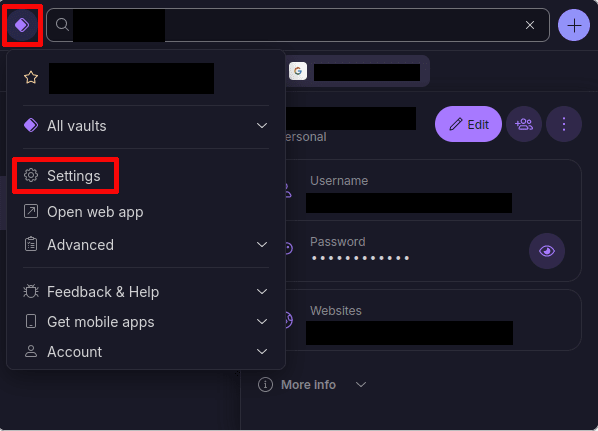
From the settings menu, click on the Export tab.
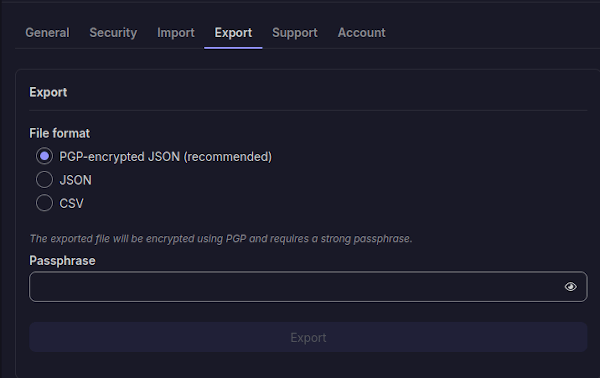
You have three options for export:
- A ZIP file containing a PGP-encrypted JSON file
- An unencrypted ZIP file
- A CSV file
We recommend encrypting the file if you plan to store it as a backup or if you want to transfer it in some way. The other two options depend on where you plan to import your passwords, as some password managers will take one file type and not the other.
If you choose to encrypt your file, you must select a memorable passphrase and enter it in the passphrase field. (If you need help creating a passphrase, you can use our password generator.) When you’re done, click Export. The file will be downloaded to the default folder on your hard drive.

You can import a PGP-encrypted ZIP file directly into Proton Pass (see below).
To import it into another password manager or otherwise access your data without importing it into Proton Pass, you will need to decrypt the file. To do this:
Windows
1. Install GPG4Win(new window) (default settings).
2. Extract the exported ZIP file and open the folder “Proton Pass” to find the file data.pgp.
- Right-click data.pgp → Decrypt and verify.
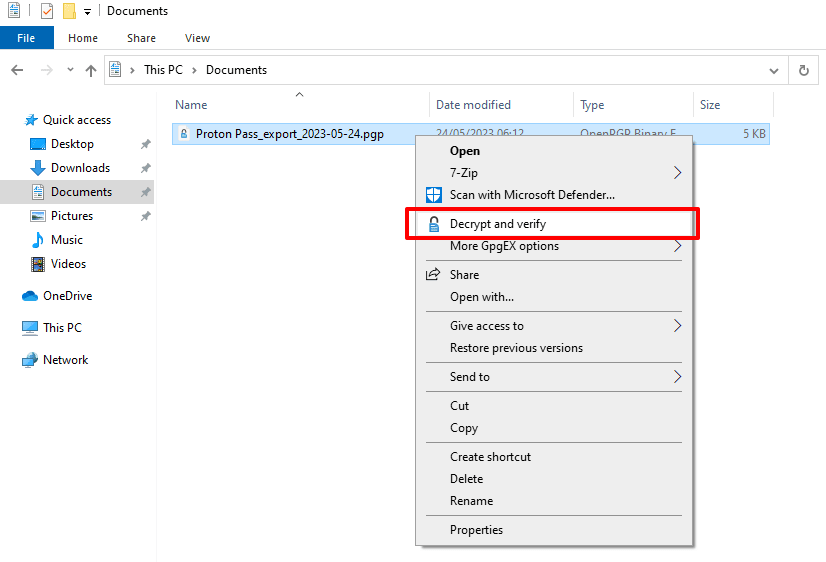
3. Enter the password you created when exporting the file and click OK.
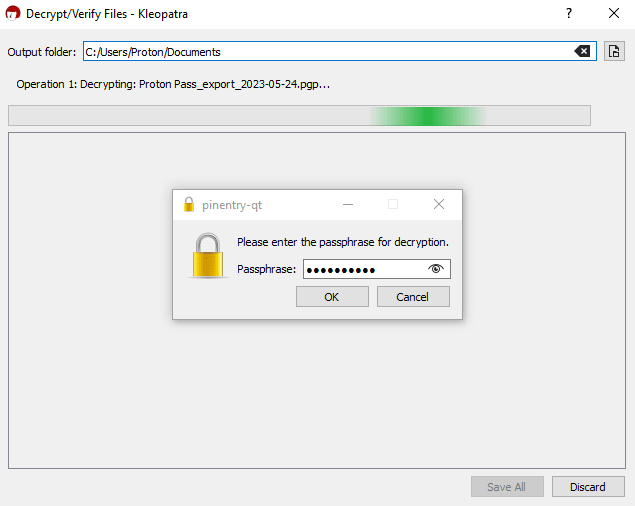
4. Click Save All.
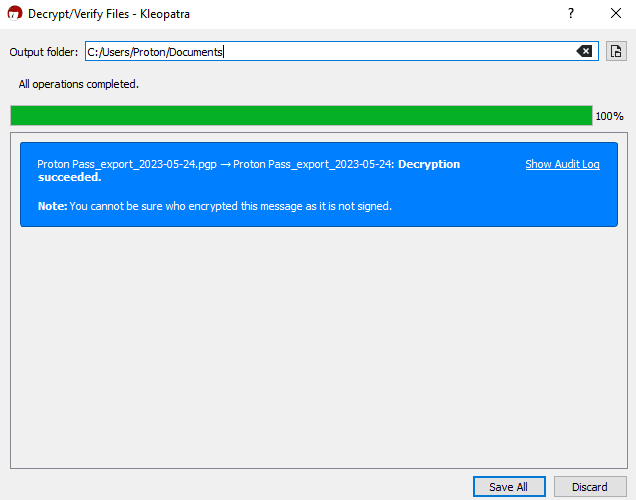
5. This will save a decrypted copy of a JSON file to the same folder that you can open with any text editor software.
Optionally, you can add the “.json” file extension: right-click the file → Rename and add “.json” to the end of the file name.
macOS
1. Install GPGSuite(new window).
2. Extract the exported ZIP file and open the folder “Proton Pass” to find the file data.pgp.
- Right-click data.pgp → Services → OpenPGP → Decrypt File.

3. Enter the password you created when exporting the file and click OK.
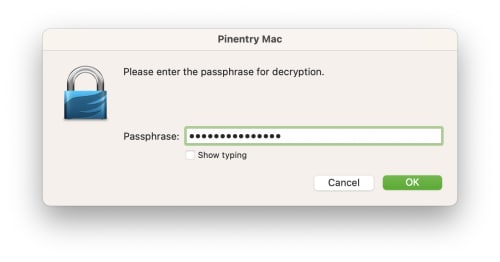
4. This will save a decrypted copy of a JSON file to the same folder that you can open with any text editor software.
Optionally, you can add the “.json” file extension: right-click the file → Rename and add “.json” to the end of the file name.
Linux
Most Linux distros have built-in PGP support. Just open the file and enter your password to decrypt it. You can also use the command line (name the destination JSON file whatever you like):
gpg --decrypt Proton\ Pass_export_[date].pgp > Pass_decrypted_export.json
How to import data exported from Proton Pass to Proton Pass
When you export your data from Pass, it’s saved as either an unencrypted ZIP file or a ZIP file containing an encrypted PGP file. You can import either type of file directly into Pass. To do this:
You can import your data from Proton Pass via our browser extensions, web app, and Windows app.
- Access the settings menu by clicking or tapping on the gear icon. This icon is located in the menu under the Proton logo in the browser extension, and in the bottom left of the web app.

- Go to the Import tab and select Proton Pass from the list.
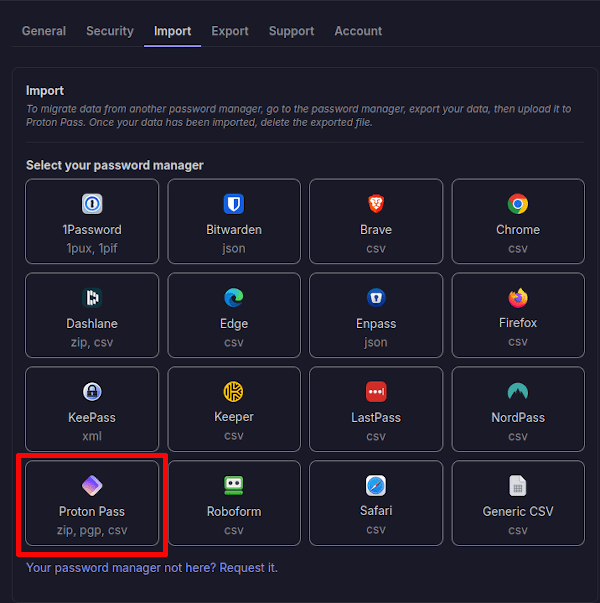
- Drag the ZIP file you exported into the File box or click the Choose a file or drag it here button to manually select it using your system’s file manager.

If you are importing a ZIP containing an encrypted PGP file, you’ll be asked to enter the passphrase you created when you exported it. Click Import when you’re done.